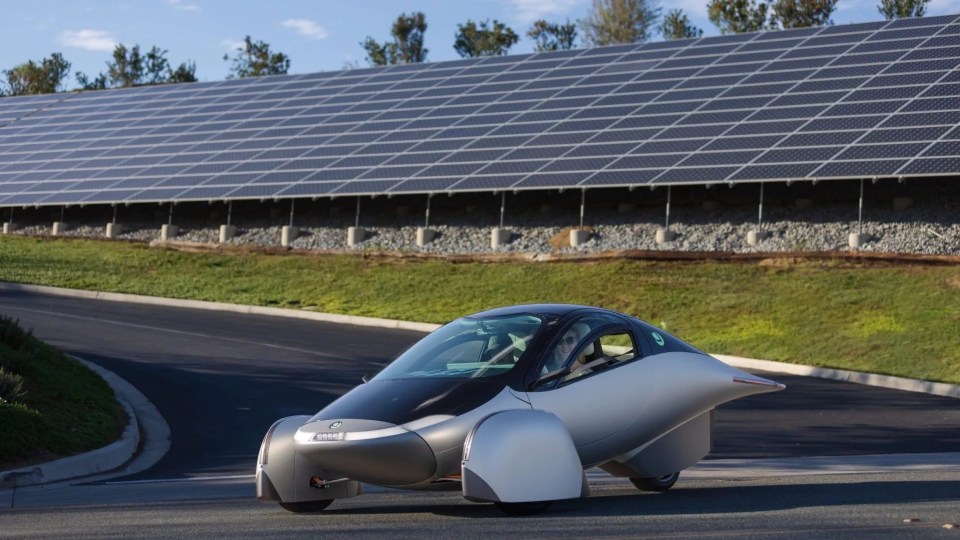THE first car to self-charge using solar power has hit the market, and thousands of drivers are eager to get behind the wheel.
Even though the car can only go a few dozen miles using solar tech, drivers can’t wait to save time and money on recharging the battery.

4

4
On Tuesday, Aptera Motors showcased its new three-wheel car at an event in San Francisco, California.
Curious car lovers flocked to the street to look at the quirky, two-seat vehicle that’s “driven by the sun.”
They were able to open up the Lamborghini-style doors and climb into the futuristic-looking ride, which the company describes as similar to a small and fast aircraft.
The car can travel 40 miles daily using only solar-powered driving, meaning drivers can run their daily errands without needing a charge.
read more on evs
Tapping into its EV capability, an Aptera car can travel up to 1,000 miles on a single charge.
The car weighs 65% less than other EVs and because of its unique, streamlined design, the model requires only about 30% of the energy other electric vehicles use.
The cars will be coming out in quarter two of next year, according to Chris McCammon, the head of content at Aptera.
“We’re really excited,” he told ABC affiliate KGO at the event in San Francisco.
“You’re going to start seeing these all over the place.”
McCammon said 48,000 people have already reserved cars from the company and 500 of those drivers live in San Francisco.
To fulfill the orders, Aptera is looking for funding to mass-produce the cars.
The vehicles will cost $35,000, which is far cheaper than the average EV price of $56,000, according to Kelly Blue Book.
For those wanting an inside look at the cars, a YouTuber took one for a spin and gave his reaction.
EV FURY
Though EVs are still far more expensive than used gas vehicles, prices are falling as automakers race to keep up with demand.
It’s predicted a whopping 65% of new car sales will be electric by 2030, Bloomberg reported.
Though electric drivers can save on gas, some are still frustrated with recharging their new rides.
One driver said she feels like she’s constantly negotiating with others on the road to score a charger.
“Even early in the morning often, I’ll encounter between one to five people waiting in line, and often there will be you know two or three, two to three stations working out of four,” Emily Hampton told NBC affiliate KNBC.
Electric vehicles vs gas

Pros and cons of EVs vs gasoline-powered vehicles
EV PROS:
- Convenient (when charging at home)
- Cheaper (depending on state or city)
- Cheaper maintenance, due to lack of mechanical parts
- Great for commuting
- Reduced CO2 emissions
- Federal and state tax incentives
- More performance (speed, handling – depending on the make and model)
EV CONS:
- Higher initial cost
- Higher insurance rates
- More frequent tire and brake replacement intervals
- Higher curb weight (thus causing more rapid wear on crucial parts)
- Low resale value
- High depreciation rates
- Lack of charging infrastructure
- Unreliable public charging (related: slow charging times)
- Poor winter and summer performance
- Lack of clean energy alternatives means more “dirty energy” from coal and nuclear sources
- Range anxiety
GAS PROS:
- Highly developed refueling infrastructure
- Fast refueling
- Cheaper insurance rates, depending on make, model, and configuration
- Established repair industry
- Lower initial cost
- Higher range before refueling, especially with hybrids
- Many manufacturers produce nearly emission-less engines
- Cheaper refueling, depending on the location
GAS CONS:
- Finite resource (related: heavy dependence on petroleum)
- Carbon emissions/greenhouse gases
- Higher repair costs
- Higher insurance rates, depending on make, model, and configuration
- Varying costs at the pump, depending on state, city, and county
Source: Car & Driver, Perch Energy, AutoWeek
Some gas stations are shutting locations to shift resources to EV charging to curb this issue.
In March, Shell said it was planning to close 1,000 gas-focused store locations this year as it prepares for the EV takeover.
Read More on The US Sun
The EV update comes after electric owners blasted a resort’s rule that required them to pay a $60 daily “etiquette” fee.
And another driver has shared a bizarre video of an EV “graveyard” filled with broken down cars.

4

4
